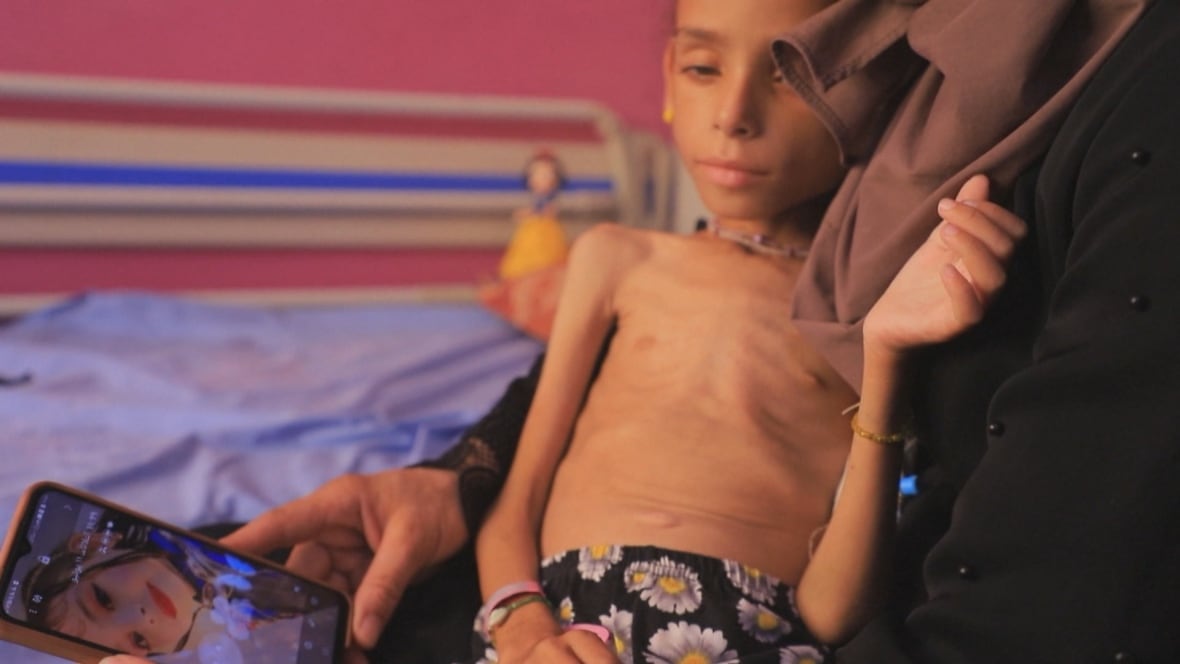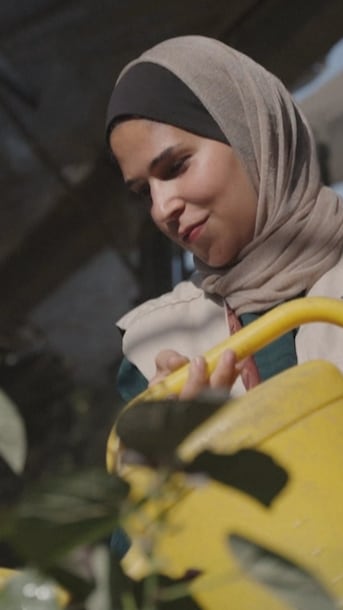Nabil Elooh walks between tents made of white tarp and mounds of rubble in Gaza City, carefully checking on the plants in his little garden, where sprouts of arugula and other greens stand tall.
He uses basic tools to till the soil and tend to the leafy vegetables that will be meals for him in the coming days.
“A tomato or an eggplant helps us to endure and eases the hunger in times when everything is expensive,” said Elooh, noting this is his fifteenth displacement since the war began.
He got his gardening supplies from a group called Thamra, an organization that distributes seeds and food that they grow in a makeshift greenhouse, also in Gaza City.
While a UN-backed hunger monitor has confirmed famine has struck Gaza, a group called Thamra is planting fruits and vegetables to preserve the land and combat starvation. This is a journalistic collaboration of public service media who are members of the European Broadcasting Union (EBU), including CBC News.
Leena Al Madhoun says she started Thamra — the Arabic word for fruit — to combat starvation and help provide people with food rather than wait for the borders to open. But most of all, she says she was inspired by the message that the act of working the land sends in the midst of war, a blockade and famine.
“We want to tell the world and the occupiers, ‘We are not leaving here. This is our land, we will plant it and we will stay here.’ ”
From the desperate planting of seeds among rubble, to mothers desperate to feed their children, to doctors who grapple with hunger pains during their rounds, famine in Gaza is taking a toll on every aspect of life. Now, members of the European Broadcasting Union — together with their journalists on the ground in Gaza — are uniting to document how Palestinians are struggling to survive the famine and how others are working to find solutions.
Foreign journalists, including the CBC, have not been allowed to enter Gaza in two years.
The Integrated Food Security Phase Classification, which monitors hunger levels, has warned the crisis in parts of Gaza has reached the most severe level. Israel dismissed the report.
Parents desperate to feed children
The UN-backed Integrated Food Security Phase Classification (IPC), published a report last week saying that famine conditions now exist in Gaza City. It concluded that without a ceasefire, famine would spread to the rest of the enclave by the end of September. Israel rejected their findings, claiming steps had been taken to increase the amount of aid coming into Gaza in recent weeks.
Israel’s aid blockade began in early March, and though pauses in fighting began last month to allow food and humanitarian aid to enter the enclave, Israel’s military announced Friday that it was suspending those pauses in Gaza City to begin its planned offensive on the area.
The Gaza Health Ministry said on Friday that 322 people have died due to severe malnutrition and starvation, including 121 children.
Maryam Dawas, 9, screams in agony on her bed at the Al-Rantissi hospital in Gaza City. The little girl looks frail, her skin stretched taut over her protruding bones as she continues to squirm with her mother by her side.
“I miss eating, I feel tired and hungry,” Maryam said. “I’m scared of the rockets and the war and I die.”

She is among hundreds of children suffering from severe malnutrition in Gaza. Even in the hospital, the food they get is limited. A UN report released Aug. 7 concluded that rates of malnutrition in the enclave had reached “the highest levels to date.”
Maryam’s mother, Mudalla, feeds her the little food they have — today, a bit of pureed chicken and rice — to keep her health up in case they’re ordered to leave Gaza City. Israeli Prime Minister Benjamin Netanyahu confirmed earlier in August that his country plans to “take over” parts of Gaza City, which its troops have not held since the start of the war.
“I force her to drink so she can stay a little healthy,” said Mudalla. “If we displace, she can’t walk or run.”
In addition to his work in the trauma and surgery department at Nasser Hospital in Gaza, Dr. Souleiman Iyad Al-Derbi does what he can to care for wounded Palestinians at the makeshift camp in Al-Mawasi. This is a journalistic collaboration of public service media who are members of the European Broadcasting Union (EBU), including CBC News.
Caring for the wounded on an empty stomach
Dr. Souleiman Iyad Al-Derbi works in the trauma and surgery department at Nasser Hospital in Khan Younis. The resident from Rafah has also been caring for his siblings after his parents were killed in an airstrike early in the war.
Al-Derbi, 30, says he has trouble standing during his rounds at the hospital because of how hungry he is, but he must continue working so he can support his family and help the sick and injured.
“We feel a lot of pain and feel exhausted and extremely tired during operations or in any department due to malnutrition,” he said.
When he’s done his shift at the hospital, Al-Derbi returns to the camp in Khan Younis where he lives, but his work is still not finished. He also does rounds here, checking on people who have left the hospital but may still have injuries.
On this day, he’s tending to the wounds of a young boy whose leg was amputated. The doctor encourages the boy to push through the pain as he cleans the wound and wraps it up quickly. Soon, his screams fade, and his smile reappears.
For an exhausted Al-Derbi, this will have to be enough.
“I wish for one thing: an end to the war,” he said. “We have no energy left.”
This is a journalistic collaboration of public service media who are Members of the European Broadcasting Union (EBU). Their reporters filmed these stories on the ground in the Gaza Strip during the month of August. Contributing organizations include: CBC (Canada), RTBF (Belgium), EPTV (Algeria), NOS (The Netherlands), RTVE (Spain) RSI (Switzerland) and RTS (Switzerland).
www.cbc.ca (Article Sourced Website)
#gardens #rubble #doctors #good #Gazans #desperate #survive #famine #takes #hold #CBC #News



